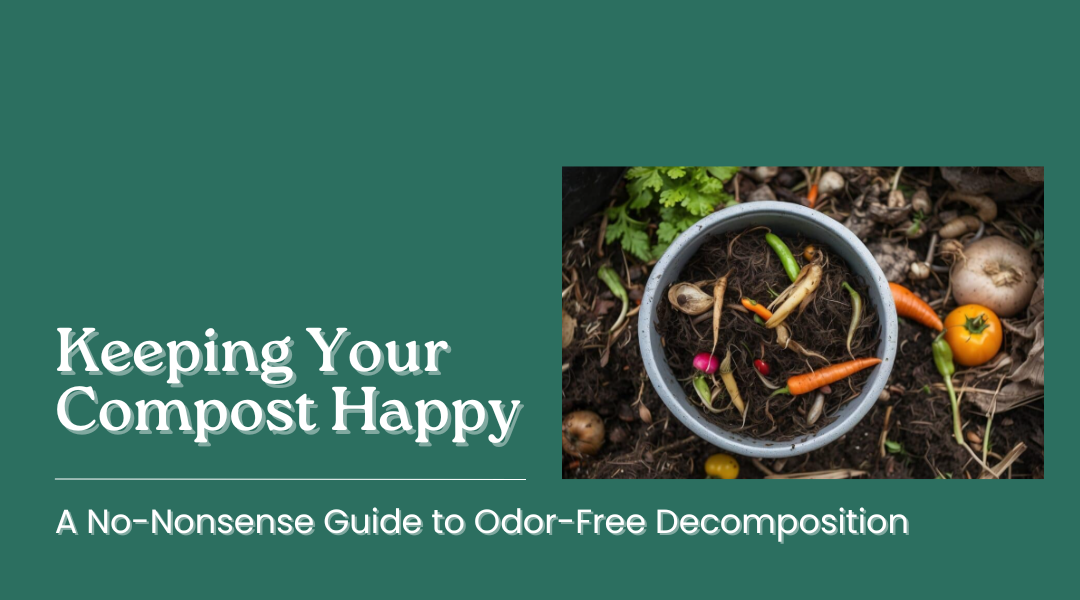Let’s be honest—nobody wants a stinky compost pile. When done right, composting should smell like fresh earth after rain, not a forgotten lunchbox. Whether you’re composting in a backyard bin or under the kitchen sink, a little maintenance goes a long way. Here’s how to keep things running smoothly (and smelling fresh).
Why Compost Stinks (And How to Fix It)
A healthy compost pile has an earthy, woodsy scent. If yours smells like anything worse than damp leaves, something’s off. Here’s the breakdown:
1. The Ammonia Funk (Too Many Greens)
- Cause: Overloading on kitchen scraps (fruit peels, veggies, coffee grounds).
- Fix: Add more browns—shredded cardboard, dried leaves, or straw. Think of it as balancing a salad with croutons.
2. The Rotten Egg Stench (Not Enough Air)
- Cause: Compacted, soggy compost where anaerobic bacteria thrive.
- Fix: Turn the pile with a fork or stick a few PVC pipes with holes into it for airflow. Fluff it like a pillow.
3. The Forgotten Fridge Smell (Wrong Ingredients)
- Cause: Meat, dairy, or oily foods rotting instead of decomposing.
- Fix: Stick to plant-based scraps. Bury food waste under browns to deter pests.
Simple Maintenance Habits
For Indoor Bins:
- Freeze scraps first – Stops smells before they start.
- Line with newspaper – Absorbs moisture and makes cleanup easier.
- Sprinkle baking soda – A pinch neutralizes odors (worms don’t mind).
For Outdoor Piles:
- Turn weekly – Like stirring a giant earthy soup.
- Cover in rain – A tarp or old carpet keeps it from becoming a swamp.
- Layer wisely – Alternate greens (food scraps) and browns (leaves, paper) like lasagna.
Troubleshooting a Lazy Compost Pile
Problem: Nothing’s Breaking Down
- Likely culprit: Too dry or too much carbon (wood chips, straw).
- Solution: Spritz with water and add a shovel of fresh grass clippings or coffee grounds to kickstart decomposition.
Problem: Pile is Damp but Inactive
- Likely culprit: Lack of oxygen.
- Solution: Turn it and add bulky materials like sticks to create air pockets.
Problem: Unwanted Critters
- Likely culprit: Exposed food.
- Solution: Bury scraps under 6” of browns or use a rodent-proof bin.
Pro Tips for Faster Compost
- Chop it small – A blender pulse for kitchen scraps speeds things up.
- Add a compost accelerator – A handful of garden soil or finished compost introduces microbes.
- Keep it warm – Sunlight heats up the pile (but don’t let it dry out).
When to Leave It Alone
Compost isn’t a needy pet. If your pile:
- Smells like a forest floor
- Is warm in the middle
- Shrinks over time
…then you’re doing it right. Stop fussing and let nature work.
Final Thought
Good compost shouldn’t be high-maintenance. If it stinks, tweak the greens/browns ratio. If it’s slow, add air or water. And if critters invade, cover the snacks. With these basics, you’ll turn scraps into garden gold—no nose plugs required.
